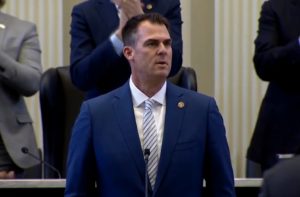Oklahoma state superintendent unveils incentive-based teacher pay plan, targets literacy, trashes ‘equity’
Oklahoma’s top education official scrapped an across-the-board pay raise for public school teachers and instead proposed rewarding the state’s best teachers.
State Superintendent of Public…

Oklahoma’s top education official scrapped an across-the-board pay raise for public school teachers and instead proposed rewarding the state’s best teachers.
State Superintendent of Public Instruction Ryan Walters also promised to keep radical ideologies and inappropriate books out of the classroom.
The incentive pay plan will cost $150 million annually versus $300 million for across-the-board pay raises, according to the Norman Transcript.
The monies saved by the change will be directed toward increasing student literacy in the state, which fell for all eight years the previous superintendent served, according to the Oklahoma Council of Public Affairs (OCPA).
The State Board of Education unanimously approved Walters’ new plan Thursday.
Former superintendent Joy Hofmeister previously recommended a $5,000 pay raise for every teacher, but Walters, who was elected in November, is instead “requesting $150 million in incentive pay boosts so districts can reward the best and brightest educators with monetary incentives ranging from $2,500 to $10,000,” the Transcript reports.
“The Legislature’s done a great job at raising base pay,” said Walters. “But to increase student outcomes, which is my metric on everything I do, is to increase student outcomes. That’s what we need to be doing.”
Walters wants teacher pay to be determined by a variety of performance factors including student performance, certifications, qualifications, classroom best practices and teacher professional growth.
“We believe that we have to find ways to find teachers who are doing a great job, No. 1, but also incentivize them as they continue to grow,” he said, according to the Transcript.
Walters is also proposing $100 million in funding to raise literacy rates.
“If a student can’t read going into third and fourth grade, the likelihood of them graduating on time, the likelihood of them having mastery in other subjects, is greatly diminished,” Walters said, according to OCPA.
OCPA noted while the pandemic brought down test scores for Oklahoma third-graders, test scores prior to the pandemic showed 38.5 percent of students “at risk” in reading.
Currently, 48.8 percent of third-graders are at risk.
“We will reform all of our education system,” Walters promised.
“There will be accountability and transparency. There will be school choice. We will ensure that indoctrination and CRT (Critical Race Theory) are eliminated in our state.
“We will also make sure that our kids are safe. There will be no boys in the girls’ bathrooms. There will be no pornography in our schools. We will make sure all of our vendors and schools are focused on education and not ‘diversity, equity, and inclusion.’”



